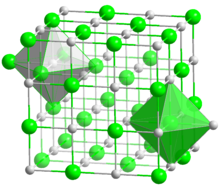Rubidium hydride - Simple English Wikipedia, the free encyclopedia
 | |
| Names | |
|---|---|
| IUPAC name Rubidium hydride | |
| Other names Rubidium(I) hydride | |
| Identifiers | |
| |
3D model (JSmol) | |
PubChem CID | |
CompTox Dashboard (EPA) | |
| |
| Properties | |
| RbH | |
| Molar mass | 86.476 g/mol |
| Appearance | white cubic crystals |
| Density | 2.60 g/cm3 |
| Melting point | Decomposes at 170°C |
| reacts | |
| Structure | |
| cubic, cF8 | |
| Fm3m, No. 225 | |
| Thermochemistry | |
| Std enthalpy of formation ΔfH | -52.3 kJ/mol |
| Related compounds | |
| Other anions | {{{value}}} |
| Other cations | {{{value}}} |
Except where otherwise noted, data are given for materials in their standard state (at 25 °C [77 °F], 100 kPa). | |
| Infobox references | |
Rubidium hydride is a chemical compound. It contains rubidium and hydride ions. Its chemical formula is RbH. It is a strong reducing agent and will react with water, air and chlorine violently. It is made by disproportionating hydrogen by reacting hydrogen with rubidium hydroxide. This process also produces rubidium oxide. It is normally made by reacting rubidium and hydrogen.
Related pages
[change | change source]References
[change | change source]- ↑ Lide, David R. (1998), Handbook of Chemistry and Physics (87 ed.), Boca Raton, FL: CRC Press, pp. 4–79, ISBN 0-8493-0594-2


 French
French Deutsch
Deutsch